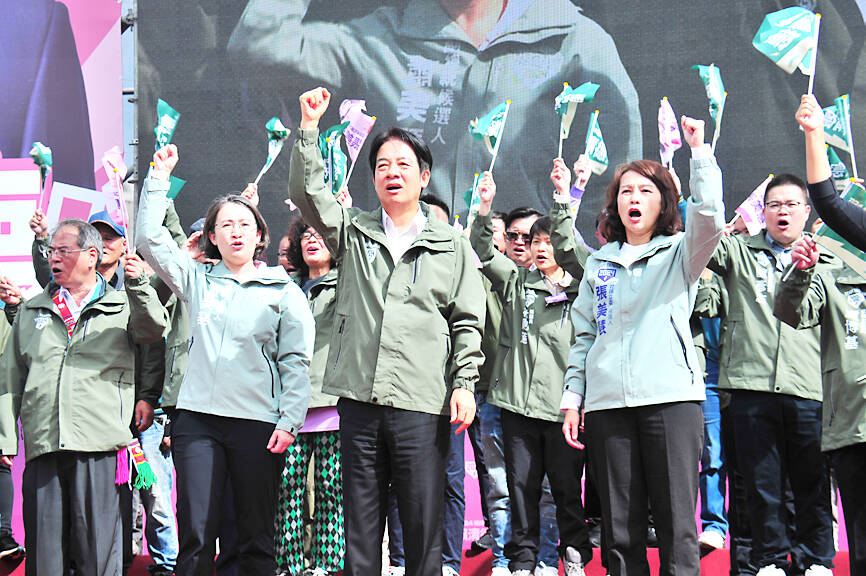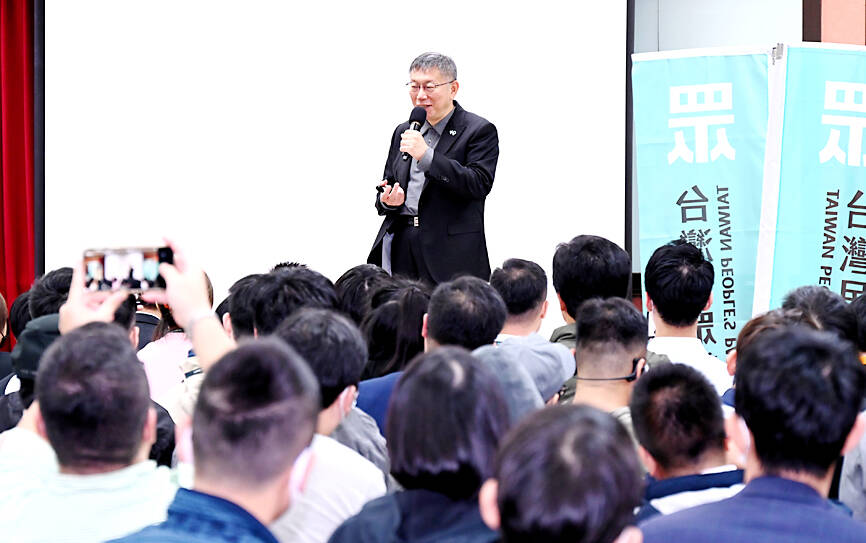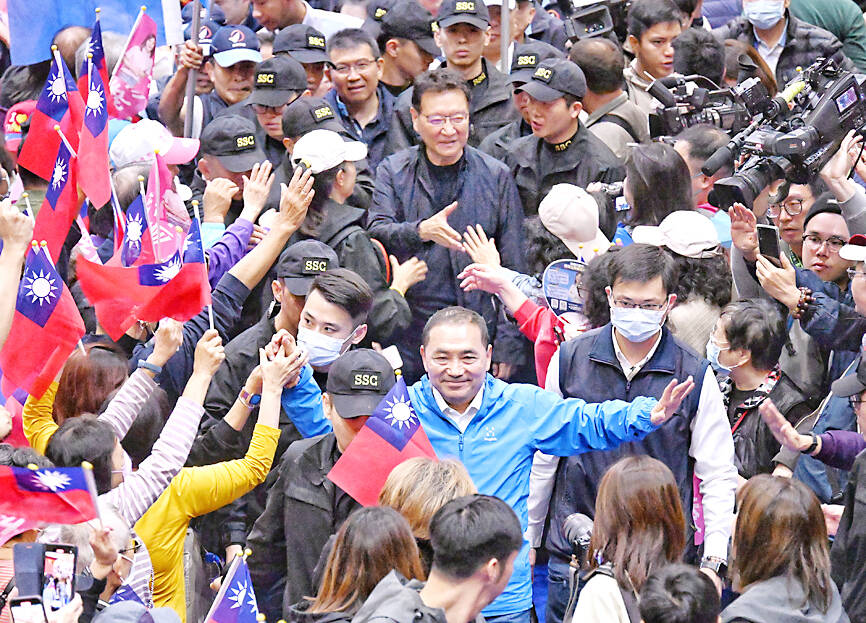Vice President William Lai (賴清德), the Democratic Progressive Party’s (DPP) presidential candidate, and his running mate, former representative to the US Hsiao Bi-khim (蕭美琴), yesterday held their first campaign rally together in Hualien City, calling January’s election a fight for the survival of the country.
Taiwan has followed the right path under President Tsai Ing-wen (蔡英文) over the past seven years, and the nation needs a leader who will keep it moving forward, Lai said.
After naming Hsiao as his running mate on Monday last week, the pair the next day registered for the Jan. 13 election.

Photo: Wang Chin-yi, Taipei Times
In a TV interview aired on Saturday, her first since returning to Taiwan for the campaign, Hsiao responded to concerns from opposition parties that keeping the DPP in power would lead to war with China, saying that all Taiwanese advocate peace and war would never be considered an option.
“Any candidate aspiring to win the election must approach this matter with the utmost responsibility,” she said.
“Our campaign team is also exercising great caution in strategizing how to increase Taiwan’s international support, ensuring that the current peace and stability in the Taiwan Strait can be maintained,” she added.

Photo: Chu Pei-hsiung, Taipei Times
In Hualien, Lai said he and Hsiao have an unwavering commitment to safeguarding Taiwan’s democracy, and pledged to align the nation with democratic societies worldwide.
The election boils down to a choice between democracy and dictatorship, he said, adding that voting for the Chinese Nationalist Party (KMT) could diminish Taiwan’s democracy and sovereignty.
At a campaign event in Taipei, New Taipei City Mayor Hou You-yi (侯友宜), the KMT’s presidential candidate, said DPP was resorting to ideological manipulation in its campaign.

Photo: Fang Pin-chao, Taipei Times
“Who could love Taiwan more than I?” Hou said.
“Lai pays lip service to loving Taiwan, while I show my love for Taiwan through my actions and with my life,” he added, alluding to his previous career as a police officer.
“The KMT is the party that could really safeguard Taiwan’s sovereignty, dignity and peace,” said Hou’s running mate, Broadcasting Corp of China chairman Jaw Shaw-kong (趙少康).
Hou reiterated the party’s long-held warning to voters that the election is a choice between war or peace.
If the DPP wins the presidential election, it would likely lead to war with China, he said.
“That is why I joined the presidential race. My main goal is to protect Taiwan with my life, and to ensure cross-strait peace,” he said.
Taiwan People’s Party (TPP) Chairman and presidential candidate Ko Wen-je (柯文哲), running with TPP Legislator Wu Hsin-ying (吳欣盈), did not hold a large campaign event, but instead attended a gathering with a group of young people in Taipei.
“I am still the strongest candidate among the opposition parties,” Ko said.
Regarding an alleged vote-allocation plan by the KMT to “save [Hou] and dump [Ko],” the former Taipei mayor said that “Taiwan is a nation full of surprises, and we will continue to strive for victory.”
Additional reporting by Huang Ching-hsuan

Taiwan has received more than US$70 million in royalties as of the end of last year from developing the F-16V jet as countries worldwide purchase or upgrade to this popular model, government and military officials said on Saturday. Taiwan funded the development of the F-16V jet and ended up the sole investor as other countries withdrew from the program. Now the F-16V is increasingly popular and countries must pay Taiwan a percentage in royalties when they purchase new F-16V aircraft or upgrade older F-16 models. The next five years are expected to be the peak for these royalties, with Taiwan potentially earning

STAY IN YOUR LANE: As the US and Israel attack Iran, the ministry has warned China not to overstep by including Taiwanese citizens in its evacuation orders The Ministry of Foreign Affairs (MOFA) yesterday rebuked a statement by China’s embassy in Israel that it would evacuate Taiwanese holders of Chinese travel documents from Israel amid the latter’s escalating conflict with Iran. Tensions have risen across the Middle East in the wake of US and Israeli airstrikes on Iran beginning Saturday. China subsequently issued an evacuation notice for its citizens. In a news release, the Chinese embassy in Israel said holders of “Taiwan compatriot permits (台胞證)” issued to Taiwanese nationals by Chinese authorities for travel to China — could register for evacuation to Egypt. In Taipei, the ministry yesterday said Taiwan

POSITIVE DEVELOPMENT: Japan and the US are expected to hold in-depth discussions on Taiwan-related issues during the meeting next month, Japanese sources said The holding of a Japan-US leaders’ meeting ahead of US President Donald Trump’s visit to China is positive news for Taiwan, former Japan-Taiwan Exchange Association representative Hiroyasu Izumi said yesterday. After the Liberal Democratic Party’s landslide victory in Japan’s House of Representatives election, Japanese Prime Minister Sanae Takaichi is scheduled to visit the US next month, where she is to meet with Trump ahead of the US president’s planned visit to China from March 31 to April 2 for a meeting with Chinese President Xi Jinping (習近平). Japan and the US are expected to hold in-depth discussions on Taiwan-related issues during the

‘LIKE-MINDED PARTNER’: Tako van Popta said it would be inappropriate to delay signing the deal with Taiwan because of China, adding he would promote the issue Canadian senators have stressed Taiwan’s importance for international trade and expressed enthusiasm for ensuring the Taiwan-Canada trade cooperation framework agreement is implemented this year. Representative to Canada Harry Tseng (曾厚仁) in an interview with the Central News Agency (CNA) said he was increasingly uneasy about Ottawa’s delays in signing the agreement, especially as Ottawa has warmed toward Beijing. There are “no negotiations left. Not only [is it] initialed, we have three versions of the text ready: English, French and Mandarin,” Tseng said. “That tells you how close we are to the final signature.” Tseng said that he hoped Canadian Prime Minister Mark Carney